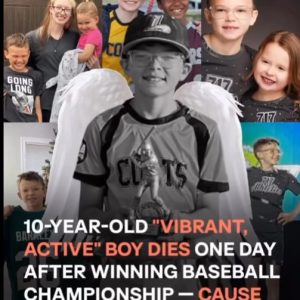It began like any other day on duty—routine patrols, radio calls, the usual rhythm of being a cop. I had no idea that before the sun would set, my heart would be broken wide open.
We were dispatched to check on a woman reportedly seen wandering near the hospital entrance. By the time we arrived, she was gone. But what she left behind would change everything.
Lying there in the hallway was a baby—so tiny, so fragile, wrapped in threadbare clothes and crying with a hoarseness that only comes from hours of being unheard. A nurse told us he’d been abandoned, left without food, warmth, or a note. No one knew who he was or where his mother had gone.
In that moment, something stirred in me. Maybe it was the echo of my own daughter’s cries from years ago. Maybe it was instinct. I didn’t think. I just moved. I sat down, adjusted my duty belt, and lifted him into my arms. He immediately reached for me, his tiny fists clinging to my vest like he’d been waiting for someone—anyone—to hold him and not let go.
Around us, time slowed. Nurses paused, patients watched, fellow officers stood silently. But none of that mattered. All I saw was a baby who needed love. And in that instant, I was the one who could give it.
His Name Was Oliver
Days passed. Then weeks. No one came forward. Social services eventually named him Oliver—a simple, beautiful name that suited his wide, searching eyes. What started as part of my job—checking in on him, following up—became something more. I found myself stopping by the hospital after shifts, holding him, feeding him, rocking him to sleep.
There was something special about him. He didn’t cry much. He watched. He listened. He trusted. Even at just a few months old, it felt like he knew who truly cared.
At home, my wife Lila saw the change in me. “You’ve been at the station a lot,” she said one evening as we folded laundry, our daughter Mia stacking blocks nearby. I nodded, not quite ready to explain that it wasn’t the station keeping me late—it was Oliver. Lila didn’t press. She just smiled knowingly. She’s always been that way—able to see what I can’t say.
One night after a particularly long shift, I returned to the hospital just to see him. It wasn’t on any report. It wasn’t protocol. But by now, everyone knew: Officer Carter had a soft spot for the baby in the nursery.
I found him awake, his eyes lighting up as I walked in. He kicked his legs with excitement, reaching out. I lifted him gently, his tiny hand wrapping around my finger. That small, instinctive grip made something in me break—and heal—all at once.
And then, the door creaked open.
The Mother Returns
She looked exhausted. Her clothes were worn. Her face, pale and drawn. For a second, I thought she might run. But instead, she whispered, “Is… is that my son?”
Her name was Elena. She had been living in her car, jobless, alone, and scared. When her son—born prematurely—needed care she couldn’t provide, she made an unthinkable decision. She left him at the hospital, praying someone would take better care of him than she could.
Later, over cold coffee in the hospital cafeteria, Elena cried as she told me everything. “I thought he’d die because of me. Leaving him… it felt like the only way he’d survive.”
I listened. Sometimes, that’s all someone needs.
When she asked what would happen next, I explained honestly: If she wanted to reclaim her son, social services would step in to help—but she’d have to prove she could care for him. With eyes full of determination, she nodded. “I’ll do whatever it takes.”
A Promise Kept
And she did.
Over the next few months, Elena fought harder than I’ve ever seen anyone fight. With help from social workers and local charities, she found stable housing, got a part-time job, and took parenting classes. Meanwhile, Oliver remained in foster care—but I visited often. He remembered me. He always did. He’d giggle when I read him stories, coo when I sang off-key lullabies, and hold onto my badge like it meant something more than just authority—it meant safety.
Eventually, the day came. Elena stood tall in court, with Oliver in her arms, ready to start over. I was there, not as a cop, but as a witness to the power of resilience. Afterward, through tears, she thanked me.
“I don’t know what I would’ve done without you.”
I smiled and shook my head. “No, Elena. You saved yourself. I just helped you remember that you could.”
Full Circle
Life returned to its familiar rhythm. Until one morning, the doorbell rang.
There they were: Elena and little Oliver, now a cheerful toddler with a mop of curls and a grin that could melt concrete. He ran straight into my arms. Elena handed me a small canvas bag. Inside was a handmade quilt stitched with stars, moons, and tiny footprints. On the back, embroidered in delicate script, were the words:
Thank you for being our guiding light.
I couldn’t speak. I just held the quilt close as tears quietly fell.
That evening, as I spread the quilt over the couch, Lila chuckled, “Looks like you’ve got another fan.” Our daughter Mia curled up on it, declaring it her “magic fort.”
And maybe it was.
The Quiet Power of Showing Up
This whole journey began not with heroism or headlines, but with a simple act of showing up. Being there. Listening. Holding on when someone else had to let go.
Being a good cop isn’t always about arrests and investigations. Sometimes, it’s about hearing a cry and answering it—not just with duty, but with humanity.
So next time you see someone struggling—be it a lost child, a frightened parent, or a stranger on the edge—pause. Offer kindness. Share a moment of compassion. Because you never know how far that one small act might reach.


